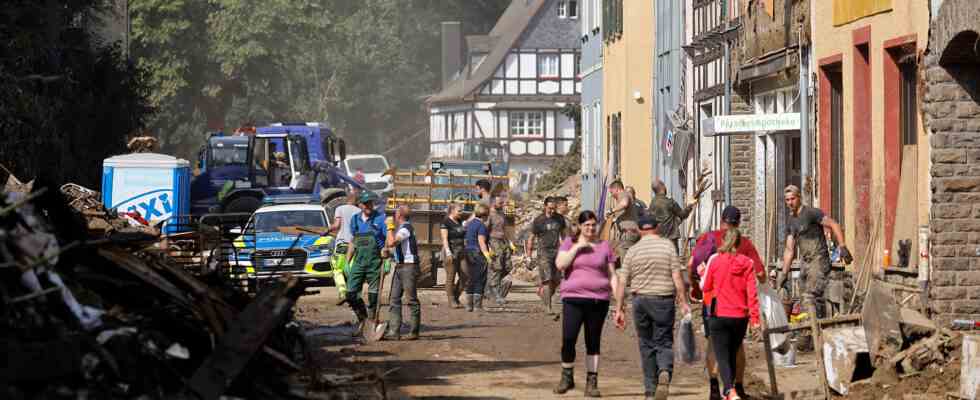Status: 08.12.2022 12:17 p.m
The countries want homeowners to insure themselves against storm damage. In the Ahr Valley, which was flooded in 2021, opinions differ. The insurance industry takes a critical view of one duty.
The Ahr stood 3.70 meters high in Gregor Orth’s workshop and warehouse in Bad Neuenahr-Ahrweiler, as the craftsman explains. The flood in July last year destroyed his roofing business and submerged equipment, tools and PCs. “The inventory was insured, but not the building,” says Orth. “Of course it’s annoying that we didn’t have elementary insurance.”
He had to invest almost 200,000 euros in the repair of his business premises, part of which was money from state reconstruction aid and donations. “Others got it worse. We have the advantage that we didn’t have any plaster on the walls, just a sheet metal facade and concrete floor,” says Orth. In the meantime, he had had his building insured against natural hazards.
What is natural hazard insurance?
The so-called elementary damage insurance covers damage caused by natural forces such as heavy rain or flooding. This protection is not automatically included in residential building or household contents insurance, mains water or storm hail insurance.
What such insurance costs – and whether an insurance company insures a house against natural hazards at all – depends, among other things, on the location of a building. The question is about how high the risk of flooding is. The insurance industry uses a system of specific risk zones to calculate policies.
Elementary damage insurance can cost several hundred euros per year for a single-family home – or it can be cheaper than comprehensive insurance for the car.
“Everyone should decide for themselves”
Maternus Fiedler also intends to do the same. Although his home in Ahrweiler is 80 meters from the river, it was almost completely destroyed by the flood. Like roofer Orth and many others in the Ahr valley, Fiedler was not insured against natural hazards, such as heavy rain or flooding.
Fiedler now wants to make up for this and has already received a concrete offer for this. It’s also affordable, he says and emphasizes: “I wouldn’t want to stay here without it.” But should such insurance be compulsory for everyone? Fiedler rejects that: “You should think about whether you need one, but everyone should be able to decide for themselves.”
At a meeting with Chancellor Olaf Scholz, the prime ministers are now discussing possible compulsory insurance against natural hazards, at least for residential buildings. This could be constitutionally implementable, the justice ministers of the federal states announced in the summer. The federal states then asked the federal government to submit a corresponding draft law. Compulsory insurance makes sense, as the natural disaster in the Ahr Valley showed all the more, said Rhineland-Palatinate Prime Minister Malu Dreyer.
Flood damage amounting to 8.5 billion euros
The flood in Rhineland-Palatinate and North Rhine-Westphalia last year caused insurance losses of around 8.5 billion euros. It was the most expensive natural catastrophe to date for the German insurance industry. If there is now an obligation to insure against such damage, then almost half of German homeowners would also have to be insured against natural hazards. Because according to the General Association of Insurers (GDV), around 52 percent of residential buildings in Germany are currently insured by natural hazard insurance.
The GDV is skeptical about compulsory elementary damage insurance: “We believe that compulsory insurance alone will not solve the problem,” says GDV General Manager Jörg Asmussen. It is more important to prevent damage from natural disasters. For new buildings in endangered areas, protective measures such as embankments or “flood-resistant building materials” would have to become mandatory, which would require changes in building law. Asmussen demands that new buildings should not be built at all in areas that are at high risk.
Insurance industry for deadline regulation
With a view to insurance protection, the GDV is in favor of amending the existing regulations. Building insurance policies that have already been taken out should be changed from a key date onwards so that they also cover natural hazards, unless the respective customer objects to this. This regulation should apply to new contracts anyway. These measures are legally safer than mandatory elementary insurance.
In any case, there are different opinions in the Ahr Valley. In contrast to Fiedler, roofer Orth sees a mandatory regulation as positive. He thinks the “solidarity idea” behind it is good, because individual claims would then be financed by all those who have compulsory insurance. The alternative is currently being experienced, namely that the state step in after a catastrophe with billions in aid: “Well, with our money anyway,” says Orth.

